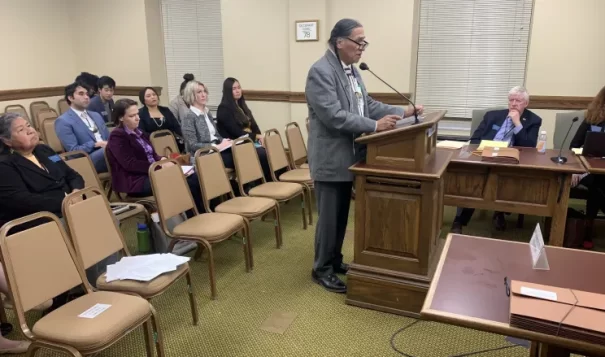News Based on facts, either observed and verified directly by the reporter, or reported and verified from knowledgeable sources.
UPDATE: Montana Native child welfare bill moving through Legislature
 Rep. Jonathan Windy Boy, D-Box Elder, presents House Bill 317 to the House Human Services Committee on Feb. 1, 2023. (Montana Free Press)
Rep. Jonathan Windy Boy, D-Box Elder, presents House Bill 317 to the House Human Services Committee on Feb. 1, 2023. (Montana Free Press)
The bill would solidify the National Indian Child Welfare Act within the state code, protecting Montana’s Native children removed from homes
A legislative bill that would solidify protections for Montana’s Native American children has gained support from the state’s House of Representatives, which approved the bill during its second reading Monday afternoon.
The bill received no vocal opposition from state representatives on the floor which ended with a 66-33 vote.
Next, the Montana Indian Child Welfare Act is due for a third reading before moving to the Senate and, pending approval, to the Governor’s desk to be signed into law.
Specifically, the bill would localize the federal Indian Child Welfare Act in the state of Montana. The act, which protects Native American children from being removed from tribal families and communities, is facing a legal challenge in the U.S. Supreme Court that some believe could nullify the law.
If passed, the Montana bill would secure the protections for children, even if the Supreme Court struck down the 45-year-old law.
The bill’s sponsor, Rep. Jonathan Windy Boy, Democrat, introduced this bill earlier in the session in an attempt to secure these protections for tribal families and children.
“Some of you probably heard that there is a federal lawsuit that’s in the U.S. Supreme Court right now,” said Windy Boy, Chippewa Cree, and Assiniboine, during his brief bill introduction Monday. He cited the case Brackeen V. Haaland by name. “That may have some ramifications on issues like this.”
The Indian Child Welfare Act was created in 1978. According to the act, states are required to follow a line of succession when placing children who have been removed from their homes. States must first try to place the children with family members; then with a family of the same tribe living on the same reservation; and finally with a Native American family before placing a child in a non-Native home.
Windy Boy’s bill, titled the Montana Indian Child Welfare Act, would create a statewide policy that keeps Indigenous children removed from their homes close to their families and communities. The act would also prioritize tribal representation at custody proceedings and offer tribal foster home placements.
Chad and Jennifer Brackeen, a non-Native couple in Oklahoma, along with two other foster families in other states, filed a lawsuit challenging ICWA as unconstitutional, saying it is a federal policy based on racial discrimination against non-Native families seeking to adopt Native children.
The Supreme Court ruling could pose a threat to tribal sovereignty by taking away tribes’ authority to handle housing placements for tribal children.
David Simmons, the director of government affairs and advocacy for the National Indian Welfare Association, based in Portland, spoke with Montana Free Press and ICT on the key values for states to enact their own ICWA laws.
Simmons said if a state has laws in place like ICWA, then the law acts as another wall of defense in resisting federal influence.
“State agencies cannot be compelled to meet federal actions and purposes without their agreement,” Simmons said. “So in child welfare, what we see is that when the federal government wants states to do certain things like child welfare, they provide them with funding or the states agree to obligate themselves through their own state policies and laws. So a state ICWA law is another protection.”
If Windy Boy’s bill is written into law, Montana would join 10 other states who have ICWA policies solidified in their own government: New Mexico, Iowa, California, Nebraska, Washington, Michigan, Wisconsin, Minnesota, Oregon and Oklahoma.
Native children make up 31 percent in Montanas out-of-home foster care placements, according to a foster care state report from 2020.
The act drew over two dozen proponents in testimony during the first hearing, and only had one opponent present, Bruce Spencer. Spencer represented the State Bar of Montana and expressed one main concern with the bill’s details.
Spencer said one of the bill’s sections would allow for the state to grant tribal representation in court hearings, a power that can only be granted from the Montana Supreme Court.
The bill was amended, removing a section nine that would allow the state to appoint a tribal representative to legally represent a tribe in court proceedings involving the child. Instead, the new section will allow for the state to give full faith and credit to tribal involvement in custody proceedings.
“I have strong appreciation for states like Montana who are being proactive and understanding,” said Simmons from the National Indian Child Welfare Association. “They have a large number of Native children and families who are citizens of the state as well as the tribes in Montana and this is really a statement for the legislature to say that they want to move and they want to create their own law and make sure those protections are there regardless.”
This story is co-published by Montana Free Press and ICT, a news partnership that covers the Montana American Indian Caucus during the state’s 2023 legislative session. Funding is provided in part by the Headwaters Foundation.
Dateline:
HELENA, Montana
